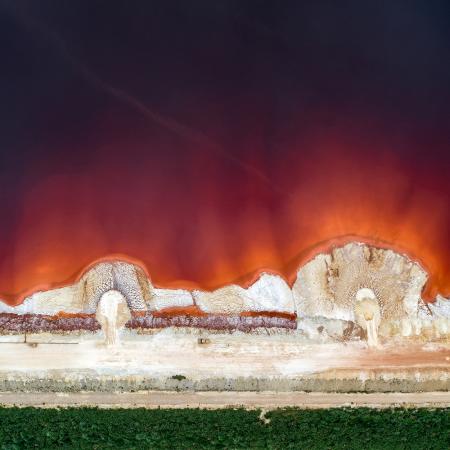"The Situation" II - Caracas
The Covid-19 pandemic will be the least of it.
Jacqueline Goldberg is a Venezuelan poet, fiction writer, essayist, editor, and author of children's books and testimonials. Her poetry has been translated and published in anthologies in 15 countries. Her most recent children's book, Pitchipoï, has been awarded by the Cuatrogatos Foundation (Miami).
In Venezuela, the Covid-19 pandemic will be the least of it.
History will perhaps say that it was benevolent, slight, a nothing.
As I write these lines (May 2, 2020, at 3 p.m.) the official numbers indicate that there are 345 infected, 148 recovered and 10 deceased in Venezuela.
Also right now, the organization that defends Human Rights, Foro Penal (Criminal Forum), reports 347 political prisoners (224 civilians and 123 military). Since March 8, when the pandemic alarms went up, there have been 80 political arrests and 11 disappeared. Since then, there have been harassments and arbitrary arrests of doctors, nurses, journalists, cameramen, broadcasters, photographers; the media have been victims of blockades and threats.
Two days ago, there was a riot at the penitentiary center in the city of Guanare, which left 46 prisoners dead and an undetermined number of wounded. That is what is known, what is believed. At this time there is no official pronouncement.
The Covid-19 pandemic will be the least of it.
According to the ONG Venezuelan Violence Observatory (OVV), in 2019 Venezuela remained one of the countries with the highest number of violent deaths in the region, and in the world. This year ended with an estimate of at least 16,506 deaths and a rate of 60.3 violent deaths per 100,000 inhabitants.
This week, a report published by the UN World Food Program (WFP) said that Venezuela is the fourth country in the world with the largest number of people in need of help to survive, with 9.3 million of people in a situation of acute food insecurity.
The Covid-19 pandemic will be the least of it.
At the moment there are more political prisoners than Covid-19 patients in Venezuela. And four times more deaths in a single jail —in one day— than from the disease in the whole country in 50 days.
No number is consistent in Venezuela.
Neither the numbers of life, nor those of death.
The absence of freedom of expression is an old pandemic.
Statistics are an unmentionable ghost. Official agencies have not published them for a long time. And when they do, we can't believe them. The reality we see on the streets always says something else.
We have a crisis in the crisis.
There are areas of the country that have suffered from a lack of gas for several years. But since the pandemic began, the fuel crisis has intensified throughout the country. People spend nights and days lining up to fill their cars. People with chronic illnesses have been unable to get to hospitals for their treatments. Crops, thousands of liters of milk and thousands of kilos of beef have been lost. Medications are not arriving at pharmacies. People begin buying gas on a black market. There have already been accidents because of that.
Even in the midst of the Covid-19 crisis, the regime has implemented a set of economic measures that make the daily lives of the Venezuelan people even harder. Every day, there have been protests and looting. Every day, social distancing measures are less respected. Today the minimum wage is $4 a month, while at least $15 is needed to purchase the basic food basket. A large part of the population lives from day to day.
The confinement is a punishment, a murder weapon, an excuse for social control. An ideal circumstance for a totalitarian and repressive regime.
My fears have been in crescendo.
Rather than concerned about getting sick, I am disturbed by the shortages of basic goods, the hunger, other illnesses, the violence. The country in a catatonic condition.
More than about illness, I am worried about losing my job, my future, my life.
Today, on the 50th day without leaving house, I dare not imagine life after confinement. The world was already very narrow for Venezuelans, full of fear and anguish. The night was forbidden territory, walking the streets was a risk. We already lived in confinement, on an island on an island. Always toward worsen. Better worse so, as Samuel Beckett wrote.
The regime has said that in the distant future we will return to a «controlled and supervised normality». And we know what that can mean in this context.
My fear is that after the lack of confinement we will remain confined, captive, prisoners. In a country forever confined, forever worse.
Spring 2020
Vol 10 No 3
"The Situation" - II
- Editorial
- Alice Yousef (Jerusalem)
- Minae Mizumura (Tokyo)
- Chandrahas Choudhury (New Delhi)
- Peter Kimani (Nairobi)
- Jacqueline Goldberg (Caracas)
- Andrea Hirata (Sumatra)
- Mabrouck Rachedi (Paris)
- Kavery Nambisan (Kodava)
- Ameena Hussein (Colombo)
- Helon Habila (Fairfax, VA)
- Amira Gehanne Khalfallah (Istanbul/Algiers)
- Marjan Strojan (Ljubljana)
- Med Magani (Algiers)
- Beaudelaine Pierre (Minneapolis/Port-au-Prince)
- Mohib Zegham (Kabul)
- Usha K R (Bengaluru)
- Nick Yu (Shanghai)
- Ksenia Dragunskaya (rural Russia)
- Haifa Abu-Al Nadi (Amman)
- Nikola Madzirov (Strumica)
- Soheil Najm (Baghdad)
- Antoinette Tidjani Alou (Paris/Niamey)
- Sabata-Mpho Mokae (Kimberley)
- Khaled Khalifa (Latakia)



